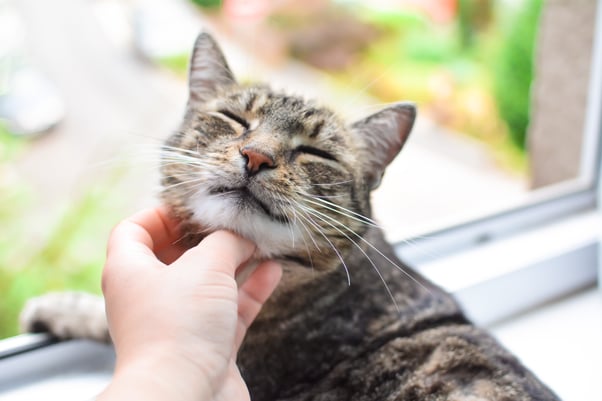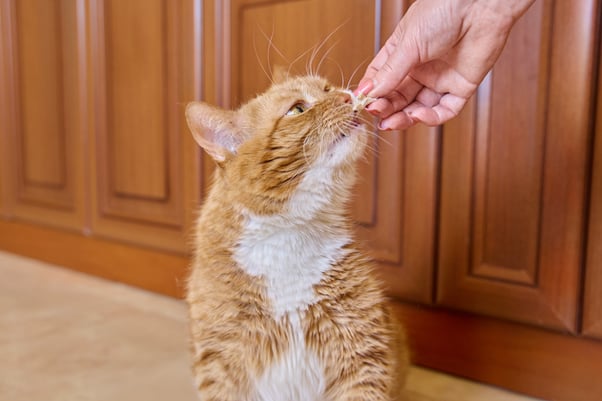Caring for Elderly Cats: A Happy Cat Expert Explains!
Thanks to advances in feline veterinary care and improvements in nutrition, domestic cats are living longer than ever. In fact, it’s not uncommon for cats to live into their late teens and early twenties. Interestingly though, cats age very differently to humans. They are considered mature after 7 years of age, senior from 11 years, and “super senior” after 15 years.
However, when cats live past “senior” age, they often require additional needs to support them. So, how can we make sure we are caring for elderly cats in the best way?
The Importance of Preventative Healthcare for Elderly Cats
Preventative healthcare for older cats is key for proactively looking after their well-being.
Regular check-ups, including both a physical exam and bloods tests, will help you and your vet identify any health concerns as early as possible. This helps to treat the problem before it becomes too serious or causes your cat any pain or discomfort. Dental issues in particular are very common, as well as kidney disease and arthritis.
Understanding When Cats Are in Pain
Cats are very stoic in their response to pain, hiding it well when they don’t feel quite right. They may hide more or become less sociable, which is easy to miss when it increases gradually.
We can often put this down to a natural part of the aging process, meaning that elderly cats may not get the treatment they need to help them feel more comfortable. When it’s really obvious that they are in pain, sadly it is usually very serious—which is why preventative care for older cats is so important.
Providing a diet specifically designed for older cats will be helpful, too. Complete diets with scientific research supporting the benefits to elderly cats will help make sure all of their nutritional needs are met and will help to keep them healthy.

Handling Elderly Cats with Comfort in Mind
Vet checks can be stressful for cats, especially when they involve a lot of handling. To avoid any unnecessary discomfort with aging cat care in particular, special effort should be made to handle them carefully both at the vets and at home.
As they get older, cats can need additional grooming as it may become uncomfortable for them to reach all areas of their body themselves. Taking time for gentle brushing can be a helpful part of caring for elderly cats, giving them lots of breaks to stop them getting over stimulated.
Creating a Comfortable Environment for Senior Cats
As cats get older, the physical changes they experience can have a big impact on their behaviour.
A very common example is when they begin to show hesitation before jumping up on to higher surfaces, such as on to your bed or the arm of the sofa. They may hesitate before jumping down too, for example, sliding their paws down the kitchen unit, before jumping down from the kitchen side.
Other things you may notice in an aging cat can include:
- Taking the stairs more slowly.
- Gingerly moving through a cat flap rather than freely passing through.
- Their movement generally becoming less fluid and more restrained.
- They may become more or less sociable.
- They may not like to go outside so much and might spend more time resting.
With this in mind, caring for elderly cats may require making changes to your home to help them, such as making it easier for them to access their favourite parts of their territory.
For example, if you know your cat likes to sleep on top of the wardrobe but suddenly stops going up there as much, it may be because the jump is now too difficult for them. Providing a series of smaller jumps or steps up to the wardrobe will really help.

Ensuring Everything is Accessible
You might also notice that older cats prefer softer, warmer places to sleep than they did when they were younger, particularly if they are showing signs of arthritis.
As well as making sure appropriate medication is in place, adding extra soft, comfortable cat beds or blankets in easy-to-reach areas can really help with caring for elderly cats. You can also use pet-safe heaters or hot water bottles (with warm water only) to help them get nice and cozy.
You may also find that your current litter tray setup becomes too difficult for your elderly cat to use. Where previously they might have clambered into a covered tray or walked from upstairs down to your kitchen to use the tray, this may now be too much of a strain on their bodies. Instead, they may start to pee in more comfortable areas such as on the carpet. Some additional trays nearby, without any high ledges or obstacles, can be a big help.
Lastly, plugging in a FELIWAY Optimum diffuser in your older cat’s favourite room can help them feel reassured as they enjoy their golden years. FELIWAY is supportive of all ages of cats, so it’s a great solution whether you’re caring for an elderly cat or a new kitten.
Caring for Your Cat as They Grow Older
It’s wonderful that our cats are living so much longer than before, and we are taking such good care of their physical health. However, it can be difficult to see when your cat’s needs change as they don’t usually make a fuss, so it’s on us to be super proactive with their medical care. By making small but very helpful changes to the home environment, you can give your elderly cat the quality of life they deserve in their later years.
For more advice on all things cat care, why not keep exploring our articles online? We have a range of fascinating insights from Lucy and all our other Happy Cat Experts! Plus, you can sign up for our newsletter to receive all the latest updates straight into your inbox.
